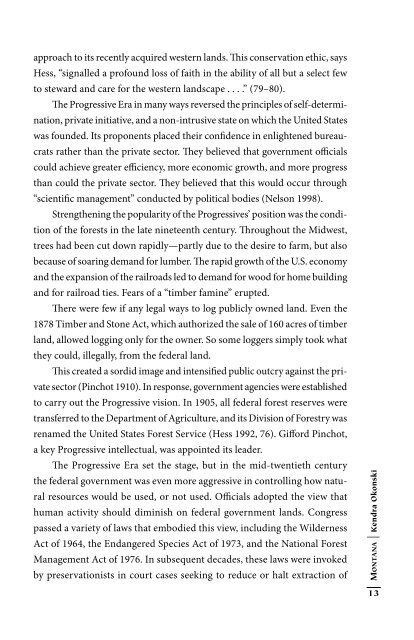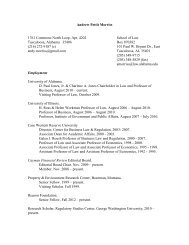Montana: On the Verge of Collapse - PERC
Montana: On the Verge of Collapse - PERC
Montana: On the Verge of Collapse - PERC
Create successful ePaper yourself
Turn your PDF publications into a flip-book with our unique Google optimized e-Paper software.
approach to its recently acquired western lands. This conservation ethic, says<br />
Hess, “signalled a pr<strong>of</strong>ound loss <strong>of</strong> faith in <strong>the</strong> ability <strong>of</strong> all but a select few<br />
to steward and care for <strong>the</strong> western landscape . . . .” (79–80).<br />
The Progressive Era in many ways reversed <strong>the</strong> principles <strong>of</strong> self-determi-<br />
nation, private initiative, and a non-intrusive state on which <strong>the</strong> United States<br />
was founded. Its proponents placed <strong>the</strong>ir confidence in enlightened bureau-<br />
crats ra<strong>the</strong>r than <strong>the</strong> private sector. They believed that government <strong>of</strong>ficials<br />
could achieve greater efficiency, more economic growth, and more progress<br />
than could <strong>the</strong> private sector. They believed that this would occur through<br />
“scientific management” conducted by political bodies (Nelson 1998).<br />
Streng<strong>the</strong>ning <strong>the</strong> popularity <strong>of</strong> <strong>the</strong> Progressives’ position was <strong>the</strong> condi-<br />
tion <strong>of</strong> <strong>the</strong> forests in <strong>the</strong> late nineteenth century. Throughout <strong>the</strong> Midwest,<br />
trees had been cut down rapidly—partly due to <strong>the</strong> desire to farm, but also<br />
because <strong>of</strong> soaring demand for lumber. The rapid growth <strong>of</strong> <strong>the</strong> U.S. economy<br />
and <strong>the</strong> expansion <strong>of</strong> <strong>the</strong> railroads led to demand for wood for home building<br />
and for railroad ties. Fears <strong>of</strong> a “timber famine” erupted.<br />
There were few if any legal ways to log publicly owned land. Even <strong>the</strong><br />
1878 Timber and Stone Act, which authorized <strong>the</strong> sale <strong>of</strong> 160 acres <strong>of</strong> timber<br />
land, allowed logging only for <strong>the</strong> owner. So some loggers simply took what<br />
<strong>the</strong>y could, illegally, from <strong>the</strong> federal land.<br />
This created a sordid image and intensified public outcry against <strong>the</strong> pri-<br />
vate sector (Pinchot 1910). In response, government agencies were established<br />
to carry out <strong>the</strong> Progressive vision. In 1905, all federal forest reserves were<br />
transferred to <strong>the</strong> Department <strong>of</strong> Agriculture, and its Division <strong>of</strong> Forestry was<br />
renamed <strong>the</strong> United States Forest Service (Hess 1992, 76). Gifford Pinchot,<br />
a key Progressive intellectual, was appointed its leader.<br />
The Progressive Era set <strong>the</strong> stage, but in <strong>the</strong> mid-twentieth century<br />
<strong>the</strong> federal government was even more aggressive in controlling how natu-<br />
ral resources would be used, or not used. Officials adopted <strong>the</strong> view that<br />
human activity should diminish on federal government lands. Congress<br />
passed a variety <strong>of</strong> laws that embodied this view, including <strong>the</strong> Wilderness<br />
Act <strong>of</strong> 1964, <strong>the</strong> Endangered Species Act <strong>of</strong> 1973, and <strong>the</strong> National Forest<br />
Management Act <strong>of</strong> 1976. In subsequent decades, <strong>the</strong>se laws were invoked<br />
by preservationists in court cases seeking to reduce or halt extraction <strong>of</strong><br />
MONTANA | Kendra Okonski<br />
13




